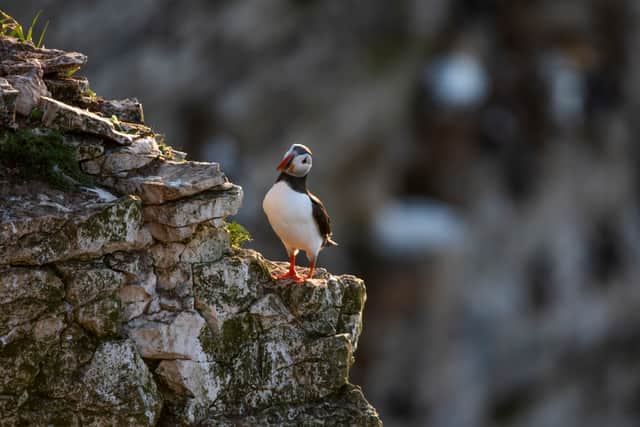Sandeel fishery closure: EU challenges UK government's puffin-protecting policy
and live on Freeview channel 276
Conservationists have hit out at the EU after it challenged a UK government move to close a northern fishery - protecting a vital food source for wildlife.
The Royal Society for the Protection of Birds (RSPB) has high hopes for the 2024 ‘puffin season,’ which runs from April to July and sees colonies of the lovable seabirds across the UK raise the next generation of adorable pufflings. Earlier this year, Defra - the government's Department for Environment, Food & Rural Affairs - called time on the North Sea’s controversial sandeel fisheries, which were closed for good as of 26 March. The vast shoals of tiny, eel-like fish are a key food source for many marine species like the harbour porpoise, as well as seabirds like the puffin and kittiwake.
Advertisement
Hide AdAdvertisement
Hide AdBut the EU Commission has challenged the UK government’s closure of the fishery. In a statement released last week, the Commission said it had requested consultations with the United Kingdom under the dispute settlement mechanism of the EU-UK Trade and Cooperation Agreement (TCA) - regarding the UK's decision to prohibit the fishing of sandeel, “with the aim of reaching a mutually agreeable solution”.
The closure of the sandeel fishery covered English parts of the North Sea and all Scottish waters, but the EU said this measure significantly restricted access to this fishery for EU vessels. It questioned whether a full closure was compatible with the UK’s principles and obligations under the TCA.


Environment, oceans and fisheries commissioner, Virginijus Sinkevičius, said: “The UK’s permanent closure of the sandeel fishery deprives EU vessels from fishing opportunities, but also impinges on basic commitments under the [TCA]. Healthy sandeel stocks are not just vital for the delicate balance of our marine ecosystems, but also for the livelihoods of our fishers.
“Measures are already in place to protect this important species, including by setting catches below the scientific advised levels and closed areas for protecting seabirds,” he continued. “Therefore, any further decisions must be proportionate to the objectives and based on sound scientific evidence, particularly when it comes to managing our shared resources.”
Advertisement
Hide AdAdvertisement
Hide AdHe added: “The EU is committed to ensure that the TCA is correctly implemented, and the principles and obligations therein are complied with by both parties. I truly hope that these consultations will result in a mutually agreeable solution for both sides.”
A UK government spokesperson told NationalWorld: “We took the decision to close our North Sea waters to all sandeel fishing to protect seabirds.” The closure was fully compliant with its obligations under the TCA, they continued, and applied equally to UK and non-UK vessels.
“This was a necessary step to safeguard vulnerable seabird populations, including species like kittiwakes who are at serious risk, and builds on domestic measures already in place - the UK has not allocated any quota to fish sandeel to UK vessels in three years,” the spokesperson added.
RSPB conservation director Katie-jo Luxton said the “outrageous” challenge by the EU Commission meant the future of beautiful birds like the puffin was being “kicked around like a political football”. “While some EU countries seem hell-bent on hoovering up sandeels on an industrial scale to feed to livestock, we believe they should be restoring marine ecosystems and nourishing baby pufflings.
Advertisement
Hide AdAdvertisement
Hide Ad“Almost 62% of seabird species are in decline across the UK, with over-fishing and climate change having decimated the sandeel stocks many rely on,” she said. “The EU should look to its own stated ambition on marine restoration, recognise that these measures support this and back down.”
The RSPB urged the UK government to stand firm on the sandeel fishery closure. “With species like our seabirds in steep decline we need to be doing so much more to safeguard the future of our wildlife, not stamping on the green shoots of progress as soon as it is made,” Ms Luxton added.
The Atlantic puffin is considered ‘vulnerable’ by the International Union for Conservation of Nature (IUCN), although in the UK the species is on the conservation red list. Birds will continue arriving on British shores throughout April, stay to raise their pufflings - with each puffin laying just one egg - and then leave at the end of July.
The seabirds spend their winters out at sea, but experts still don’t know exactly where. The RSPB said it is believed they are widely dispersed across the North Sea and wider Atlantic Ocean.
Comment Guidelines
National World encourages reader discussion on our stories. User feedback, insights and back-and-forth exchanges add a rich layer of context to reporting. Please review our Community Guidelines before commenting.
